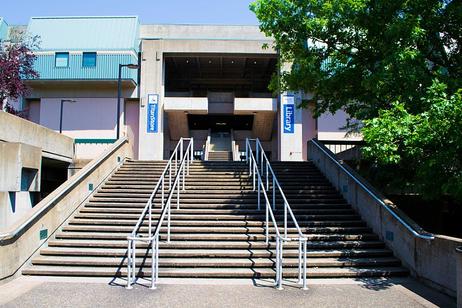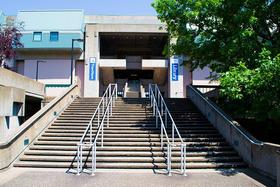This summer will be wrapping up before we know of it, and your first semester at community college is rapidly approaching. Are you ready for it?
According to American College Testing (ACT), one out of every four college students will end up leaving college before finishing their sophomore year. With statistics like these, it’s easy to see why the first year of community college is critical to success. This is a chance to build not only an academic foundation, but a real-world foundation that will carry through college, career and the rest of your life. Todd Rhoad, Managing Director at Blitz Team Consulting, perhaps puts it best, “Students should begin community college with an open mind as this is their opportunity to begin to see the world in a whole new light and begin to develop a view of the world of possibilities.”
Community college presents different challenges and experiences than most four year universities, Todd believes. “Community Colleges aren’t as glamorous and flamboyant as the bigger campuses, which seem to be more interested in their architectural coherence and student social experience. Community colleges focus on the one thing that new students need; that is, the learning experience.”
If you’re getting ready to prep for your first semester, you’re in luck, because we’ve assembled four crucial tips to get you started.
1. Set Your Goals and Have a Vision
The first step to success in community college is having a clear idea of what success means to you. What are your goals in your first semester, and over your time at community college? What is your vision for how community college will help you achieve your career ambitions? Planning this out will help you set expectations and go into the semester with the right attitude.
Todd Rhoad of Blitz Team Consulting has mapped out a 5 step process on how to set your goals.
- “Make a list of the things you like to do. What activities bring you joy and happiness? Is it working with others, teaching, learning, leading, helping others, autonomy and independence, financial gain, prestige, recognition?
- Make a list of the things you are good at. Most likely, many of these things are in the first list, but, just in case, write down the things you were really good at in high school. In high school, I was the quarterback of the football team. I liked working in teams and leading the effort. Over the years, I’ve spent time in many roles that utilize this desire (i.e. project management, leading my own company).
- Write down a list of things you expect to get from the community college experience. Do you want to earn a degree, earn credits to transfer, build a professional network, evaluate job possibilities? You need to understand why you are going to community college if you expect to get anything out of it.
- Define your boundaries. Write down any potential challenge you may have in successfully completing your list in #3. Do you have sufficient funding? Will you have a job at the same time? What other responsibilities will you have?
- Define solutions to your challenges. What can help you overcome your barriers to achieving your goals defined in #3.”
Midway through your semester, re-visit these goals and check your progress. Think about the new goals you have, and how you can accomplish them. If you continue the process of mapping out goals and updating them as your life changes, you set yourself on the course to success.
Parents can help too. Seek their advice in terms of goals and vision for community college. Alexandra Rice, Communications Manager at NerdScholar, believes parents should take an active role in support. “Even if parents don't have all the answers, the simple act of asking will help their daughter/son to feel supported, in turn easing any anxiety they may have.”

2. Meet with Academic Advisers and Professors
As your first semester approaches, be sure to take advantage of all opportunities to forge new connections. Some students make the mistake of not seeking guidance from academic advisers. They can work with you to make sure your course load is not too heavy and ensure the classes you are taking count towards your degree.
Advisors can help with tutoring, counseling, testing, and more. “They can serve as great mentors to share tips on how to be successful and can be great champions throughout a student’s college journey at the community college and beyond,” says Alexandra.
Meeting with professors shows initiative and demonstrates a commitment and a desire that most instructors do take into account. Todd Rhoad of Blitz Team Consulting has this personal insight to share about his time as a freshman: “Faculty and administration play an integral role in making the student familiar with the academic processes and in the development of their learning style.... Most big university professors have office hours and are unreachable outside of those hours. Community colleges don’t work that way.”
“After I got out of the Air Force, I utilized the GI Bill, but unfortunately it was only $9600 that was paid out $400 per month until it was gone. Colleges want their money up front. I didn’t get any money when I was discharged so I was literally broke. I didn’t want to lean on my family either. I had to do it alone, but I didn’t know how. One day I walked into a community college and talked with a young lady about scholarships. She told me about a couple of things I should apply for. I took the applications home and began to work on them."
"A few days later I get a message that I needed to see her. When I walked into her office, she called an older gentleman into the office. He introduced himself and told me that he was prior military. He handed me a piece of paper and explained that he understood my situation, which prompted him to do some research to identify numerous government programs that could help me fund my efforts. He had taken time to identify the programs and had jotted down actions I needed to complete to take advantage of these programs. I had never met him and yet he had spent his time helping me. You don’t find this in big universities.”

3. Set a Smart, Active, and Balanced Schedule
College is one of the first real challenges students face when it comes to balancing a schedule. Your schedule better be sharp, because classes are likely tougher than you’ve ever faced before. Dr. Robert R. Neuman, PhD and Author of a “A College Dean’s 12 Secrets for Success”, says students have to study significantly more on their own initiative, outside of class. “College is very different from high school. Not the same-old stuff. Courses and teachers will be much more demanding…For each three-credit course, students should study 4-6 hours per week.” Dr. Neuman recommends creating a weekly schedule that outlines activities like class time, study time, job, family responsibilities, and personal time (make time for this too, you don’t want to burn yourself out!).
Dr. Neuman believes students at community college may face unique struggles that four-year college students do not. For example, they are more likely to have to balance class commute, off-campus life/disconnect from study, and family obligations at home.
It also may be more difficult for students to find new friends and build a support group. Savvy students should get involved with extracurricular activities to help build these friendships. One of the most important things a student can do to survive their first semester of college is to find fellow students to form friendships with. Susan Johnson, Vice President of Curriculum Development at Odysseyware, encourages this to incoming freshman students. “To cultivate a sense of belonging…children should participate in community activities sponsored by the college, such as intramurals or volunteer work.”
Search out clubs and groups on campus and see where you can get plugged in. Meet other students and find instructors and leaders who may be able to become mentors in the weeks, months, and even years to come. Alexandra Rice of NerdScholar believes this is one of the best steps a student can take in their first semester. “Campus life is probably the biggest difference between community colleges and non-community colleges/universities. At community college, living in dorms isn't generally an option and many students choose to live at home to save money, therefore missing out on meeting students that way. But community college students can find opportunities to interact with their peers by joining clubs, taking on-campus jobs, and attending campus events--all fun ways to meet people outside of the classroom.”

4. Know the Particulars at Your Campus
At the end of the day, the devil is in the details. Take the opportunity to become a master freshman when it comes to your campus: classroom/building locations, credit requirements, financial aid, special learning opportunities, and everything else in between.
Susan Johnson of Odysseyware urges students to “research and take advantage of any online or blended learning opportunities that many community colleges now offer.” She believes that colleges recognize the educational and convenience values of these options, and are putting a greater priority on them.
Dr. Marilyn Fore, Senior Vice President of Horry Georgetown Technical College in South Carolina, believes new students should try to learn their campus inside and out. “Become familiar with the campus facilities for parking, student support services, classroom location, and food outlets. Become acquainted with specific student support services such as career resource center, advising, testing centers, libraries, and coaching centers.
Finally, it’s important for students to pay attention to the fine print when it comes to credits. “Students should check, and then double-check, the credit transfer policies at their intended four-year destination,” Alexandra Rice of NerdScholar says. “Ensure that courses taken at community college will transfer and be applied as desired (and not as random elective classes). This can stave off future headaches and financial strain by making sure everything transfers properly.”
Resources
There are plenty of resources to help you get ready for your community college journey. NerdScholar publishes weekly Expert Advice articles with tips on college life and beyond; from financial advice to studying abroad to landing a dream job. Dr. Robert Neuman’s book Are You Really Ready for College? can help you build a realistic view of college, and what it takes to succeed, with 12 essential and practical strategies. To get acclimated to the types of course material you’ll face on college, try Odysseyware, which features a rigorous and engaging online courses. BT Consulting is a strong resource for building out crucial self-branding skills, and learning lessons that will help in future college and career settings. Lastly, remember that your community college may have resources. Schools like Horry Georgetown Technical College offer strong orientation and advising programs, as well as alternative forms of financial support for tuition and fees.
Conclusion
With these resources and four simple tips in hand, you can be well on your way to a more successful and less stressful first few semesters at college. Remember that everyone's journey is different and that there will be highs and lows every semester. The important thing is to keep your goals on mind and to keep at it. Enjoy the good times and persevere during the bad times.
As Dr. Robert Neuman calls it, college is like playing in the “BIG GAME.” “Students have never been in one like it…I compare an excellent student with an excellent athlete. The athlete has to get in good shape, practice a lot, learn more moves on the court, learn new game strategies, and set higher goals. Similarly the student has to study a lot, develop various study skills, adopt good life habits, and set higher and higher goals.”




























